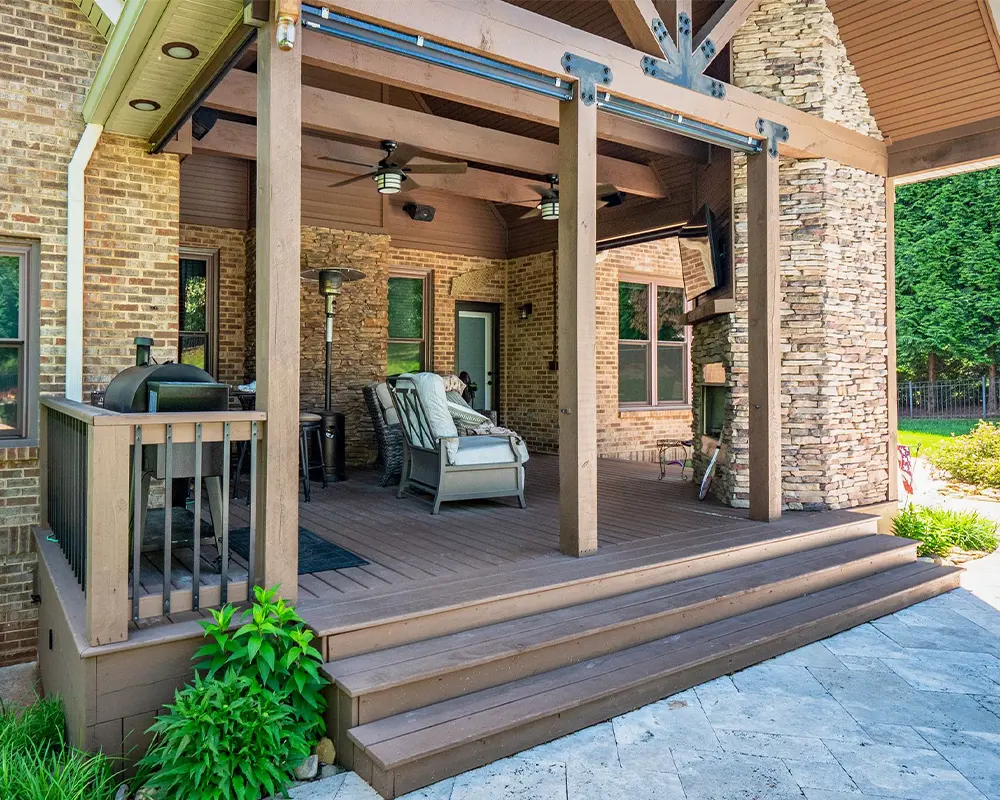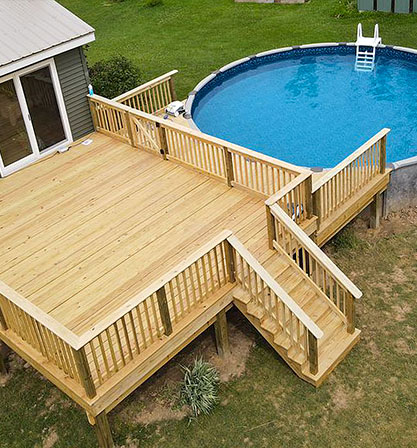Find peace of mind by hiring a experienced deck installer Austin who knows the local building codes.
Find peace of mind by hiring a experienced deck installer Austin who knows the local building codes.
Blog Article
Just how to Select the Right Materials for Your Deck Setup Project
Selecting the suitable products for your deck installment job can appear challenging. The trick is to balance your budget, style preferences, and way of life requires to produce a deck that will certainly boost your outdoor space for years to come.
Recognizing the Different Kinds Of Deck Products
When embarking on a deck installation job, the selection of products ends up being a critical decision. Compound materials, on the other hand, are a blend of wood and plastic, supplying sturdiness and resistance to weather elements. By recognizing these distinctions, home owners can make a much more enlightened decision on the most suitable deck product for their details demands.
Examining the Durability and Maintenance Demands of Deck Materials
Analyzing the durability and upkeep demands of deck materials is an essential step in deck installation. Resilience involves the product's ability to withstand severe weather problems, wear and tear, and its long life.
Comprehending upkeep demands is similarly vital. Some materials call for routine sealing or tarnishing to keep their appearance and withstand moisture damage, while others, like composite outdoor decking, demand less upkeep. By assessing these factors, one can pick one of the most appropriate decking product, ensuring a balance between durability, upkeep demands, and aesthetic charm.
Expense Evaluation: Contrasting Timber and Composite Decking
Although price may at first look like an additional concern, it is a substantial variable when comparing timber and composite decking. Timber, usually a cheaper alternative, has a lower upfront expense. Over time, upkeep expenses can build up, potentially making timber extra expensive in the lengthy run. These upkeep prices may consist of staining, securing, or changing harmed boards. On the various other hand, composite decking, while costlier at first, needs much less upkeep, possibly decreasing lasting prices. It's essential to keep in mind that composite outdoor decking isn't invulnerable to use and tear, and replacement prices can be high. Possible deck proprietors have to consider their budget and readiness to keep their decks when deciding between timber and composite decking.
Aesthetics and Design Flexibility of Decking Materials
Natural wood decking gives a classic, classic look, while composite materials use a vast array of colors and appearances to suit varied tastes and designs. Composite products, while much less versatile in style, are still adaptable enough for most deck styles. These elements, therefore, are essential factors in the choice of outdoor decking product.
Environmental Effect of Decking Products
When choosing outdoor decking products, one have to consider not just looks and sturdiness, yet also the ecological impact. It is necessary to assess the sustainability of products and check out recycled outdoor decking choices. Comprehending the possible effect on neighborhood ecological communities will make sure an extra ecologically accountable option.
Examining Product Sustainability
In the world of deck construction, assessing material sustainability is an essential step. Composite outdoor decking products commonly integrate timber and plastic, lowering the demand for new timber but boosting dependence on fossil gas - deck installation. Thus, the choice of outdoor decking products need to balance functionality, aesthetics, expense, and sustainability to guarantee a liable and resilient installation.
Recycled Outdoor Decking Alternatives

Compound decking is especially popular because of its sturdiness and convenience of upkeep. It's resistant to rot, pests, and fading, making it a lasting option. Recycled plastic decking, on the other hand, is very resilient and requires marginal maintenance. While these products might lug a greater initial cost, their longevity and reduced ecological influence make them a smart investment for the eco-conscious property owner.

Impact on Local Ecological Communities
While the benefits of making use of recycled products for decking can not be overemphasized, it's More Info similarly vital to consider the wider ecological implications of these choices. The extraction, handling, and transportation of products can greatly influence regional ecosystems. Deforestation for lumber decking adds to habitat loss and climate adjustment. Also the manufacturing of composite products can release harmful exhausts. On the other hand, using recycled or sustainably sourced products can aid mitigate these results. Additionally, considering the lifespan of materials can minimize ecological influence; longer-lasting choices need less constant substitute, thus saving resources. Correct disposal of old decking is crucial to lessening landfill waste. Essentially, an eco-conscious deck project demands mindful product choice, lasting sourcing, and accountable disposal.
Making Your Decision: Tips for Selecting the most effective Deck Materials
As the article shifts into the subtopic of "Making Your Decision: Tips for Choosing the most effective Deck Products", it is crucial to comprehend the variety of deck materials available. Striking an equilibrium in between durability and looks is necessary in this choice process. The complying with discussion will direct readers in making an informed option based on these essential factors to consider.
Understanding Different Deck Products
The job of choosing the ideal products for your deck setup can appear daunting because of the huge variety of choices readily available. Nevertheless, comprehending the different materials can simplify this process. Timber is a popular choice, supplying a traditional visual and price. Sorts of web link timber utilized consist of pressure-treated lumber, cedar, and redwood. Compound products, made from a blend of timber and plastic, are low-maintenance and resistant to rot and pests. Vinyl or PVC decks are even much more long lasting and require much less maintenance than composite products, yet they can look less all-natural. Aluminum decks are solid, lightweight, and immune to rot, however they are additionally the most costly alternative. Each product has its very own advantages and drawbacks, making it important to consider your particular requirements before making a last choice.
Sturdiness vs. Aesthetics Equilibrium
Balancing toughness with looks can be a difficulty when choosing deck materials - deck installation austin. High-traffic areas may demand long lasting materials like composite decking, which endures wear and tear but might do not have the natural charm of timber. Home owners need to strike a balance, considering both the deck's practical demands and their visual preferences.
Final thought
Finally, selecting the ideal products for your deck installation project calls for important link cautious consideration of variables such as longevity, upkeep, expense, aesthetics, and ecological effect. Whether you choose traditional timber or composite products, your choice ought to straighten with your spending plan, style preferences, and way of living. Inevitably, the most effective outdoor decking product is one that enhances your outside room and gives satisfaction for several years to come.
Report this page